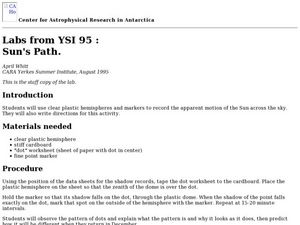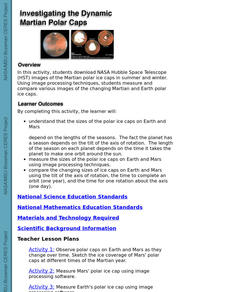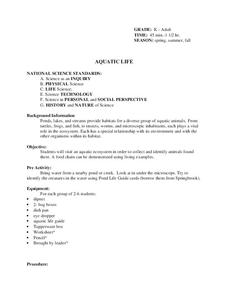Science 4 Inquiry
Investigating How Heat Flows
It is impossible to cool down a glass of water by adding ice. Young scientists explore heat transfer through videos, experiments, and interactive games. They quickly catch on that the water melts the ice and things aren't always as they...
Curated OER
A Walk in the Tundra
Discuss the environment of the Arctic tundra using this resource. The focus of this lesson is the story A Walk in the Tundra by Rebecca L. Johnson. The appealing illustrations are bound to captivate your class! After reading the...
Curated OER
The Airplane
Students demonstrate the Bernoulli Principle, review the influences that affected the Wright Brothers, and make and modify paper airplanes. This amazing lesson plan has an excellent structure, and very clear plans for the students to...
Kenan Fellows
Sensors in Chemistry
The Environmental Protection Agency monitors sensors to track air pollution and set clean air standards. Enthusiastic young scientists use similar sensors to gather data in their area and then apply the gas laws and conservation of...
National Center for Case Study Teaching in Science
A Tale of Two Houses
Does it cost more per year to heat Bill's home in North Dakota or to cool Bubba's home in Georgia? Using heat transfer concepts, mathematical equations, and critical thinking skills, young engineers work in groups to determine who is...
Science 4 Inquiry
Rocks Makin' Rocks: Rock Cycle Simulation
Scholars review prior knowledge before completing a hands-on simulation of the rock cycle. They write stories or songs summarizing their simulations to demonstrate mastery.
Teach Engineering
Capturing the Sun's Warmth
Passive solar heating is a technology that's been in use for thousands of years. Here, elementary schoolers are exposed to this type of heating, the materials that are used in passive solar heating, and they study how engineers design...
Illustrative Mathematics
Tilt of Earth's Axis and the Four Seasons
Geometry meets earth science as high schoolers investigate the cause and features of the four seasons. The effects of Earth's axis tilt features prominently, along with both the rotation of the earth about the axis and its orbit...
Curated OER
Summer Scientists
In this instructional activity, students discuss and reocrd what makes an object living or nonliving. The students then chart the lists of living and nonliving objects. Teacher allows students oportunity to go outside and look for living...
Curated OER
Hero Or Zero?
Students investigate science and technology by reading a children's book. In this reading comprehension lesson, students read the story Archibald Frisby and discuss the ways we use science and technology in everyday life....
Curated OER
Charting Seasonal Changes
Students research the Earth's patterns of rotation and revolution, create a chart and graph of these patterns and use them to explain the causes of night and day and summer and winter.
Curated OER
Understanding Seasons
Students study the four different seasons: fall, winter, spring, and summer. They match the seasons with pictures that relate to them developing an understanding of the differences. They then complete the worksheet about the seasons.
Curated OER
Fly High and Summarize
Students are introduced to the concepts of comprehension and summarizing information. They review a summerization poster which shows the information they are looking for and read a book silently. They watch the teacher model...
Curated OER
Four Seasons
Students identify the change in the seasons. In this earth science lesson, students describe weather of each of the seasons and illustrate pictures of each season. Students discuss their illustrations with their classmates.
Curated OER
Wigwam
Students create models of wigwams. They discuss winter and summer villages and the types of wigwams. They construct a wigwam using information from the Native American website to follow the scale. They present their models to the class...
Curated OER
Swords, Arrows, and Eggs
Students enjoy hands-on learning experiences. For this current events lesson, students may visit the Lulworth Castle, Roald Dahl Museum, Glasgow Science Centre, Salts Mill, or the Sherwood Forest online or in-person to discover details...
Curated OER
Astronomy
Students explore space science by utilizing education software. In this moon cycles lesson, students discuss the importance of the moon and the different phases we observe from earth. Students demonstrate the earth's orbit by creating a...
Curated OER
Sun's Path
Students explore the movement of the sun across the sky. In this science lesson plan, students use clear plastic hemispheres and markers to record how the sun moves across the sky. Students write directions so the activity could be...
Curated OER
Investigating the Dynamic Martian Polar Caps
Students download NASA Hubble Space Telescope images of the Martian polar ice caps in summer and winter, and measure and compare various images of the changing Martian and Earth polar ice caps.
Curated OER
Growing Tomatoes From Seed Activity
In this growing tomatoes worksheet, students plant tomato seeds in February, and follow their growth through the summer break. They observe and investigate the plant growth from seed to plant.
Curated OER
Aquatic Life
Learners explore aquatic life. In this science lesson, students visit an aquatic ecosystem and collect animals found there. Learners create a food chain for the aquatic ecosystem.
Curated OER
Learning About Hurricanes
Students write a research paper on hurricanes. In this weather lesson, students use a science text book to write down facts about hurricanes on note cards and then outline their essay. Students use the outline to create an organized essay.
Curated OER
Earth and Sun's Distance
Students consider the shape of the Earth's orbit around the Sun. They view the first segment of Science Court video and use Timeliner software to construct a scale of the distance between the Earth and the Sun.
Curated OER
All The Seasons
Students explore winter, spring, summer, and fall. For this science and technology lesson plan, students use "Kid Pix" to draw pictures that represent the four seasons.

























